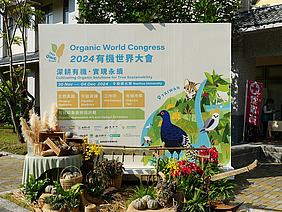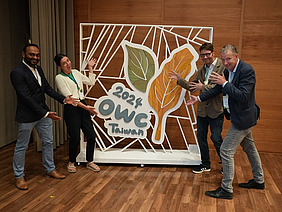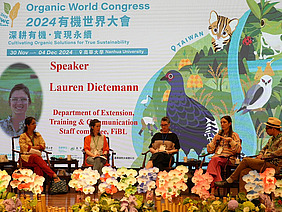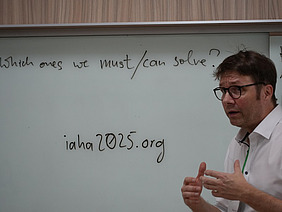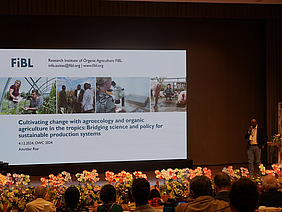FiBL staff presented their insights from current research and publications in nearly 20 oral presentation, workshops and plenary sessions, addressing topics such as animal husbandry and welfare, organic farming performance in FiBLs long-term trials DOK and SysCom, capacity building, connection science and practice, and business models.
Pre-conference "Bio-Tour"
Additionally, FiBL staff Markus Arbenz and Amritbir Riar co-organised the pre-conference "Bio-Tour" with organic research institutions worldwide, which was hosted by the Hualien District Agricultural Research and Extension Station of the Ministry of Agriculture of Taiwan in their brand new premises. Besides the host and FiBL, there was participation of the Organic Center, India, The Organic Research Center of the United Kingdom, The Organic Agriculture Centre of Canada, the Rodale Institute in the USA and ISOFAR.
The participants exchanged on latest trends in organic research and positioned the contributions of the various research institutions. While most of those participating institutions have a long-term relationship, the Organic Agriculture Research Center of Taiwan is young and a new player who contributes to the evidence building for organic development. Participants stressed the importance of systemic approaches as well as farmer and other stakeholder participation in research and development with, for instance, on-farm research or operators’ capacity building. All participants shared the objectives of consensus building for policies with positive and environmental and societal impacts. On that topic, FiBL could demonstrate its innovative leadership presenting practical methods to translate research insights into system transitions and stakeholders behavioral changes.
The "Bio-Tour" was followed up with a workshop about the possibilities of international cooperation and exchange in organic agricultural research. FiBL could further discuss the possibilities of partnering with the Hualien Organic Agricultural Research Center in which long term comparative experiments of organic and non-organic systems, the enhancement of ecosystem services, the strengthening of biodiversity and climate resilience and the creation of sector development opportunities stand in the forefront.
Workshop on challenges of organic livestock systems
The Animal Husbandry Alliance (IAHA) of IFOAM is an informal network of organisations and individuals interested in supporting and strengthening the development of organic animal husbandry within IFOAM. FiBL coordinates the alliance and FiBL staff member Otto Schmid is its president. At the Organic World Congress, Florian Leiber organised a workshop that started the discussion around the major challenges of organic animal husbandry across the world, how close we are with livestock husbandry to the four organic principles and develop a common vision of the future of organic animal husbandry.
The workshop initiated a process of developing a common statement of the global organic animal community in order to position organic in the contemporary debates about the future of livestock in agriculture. This process is thought to be continued in an international organic livestock conference, organised by the IAHA, planned for September 2025 in Switzerland.
Apart from IAHA, other IFOAM sector platforms with FiBL leadership contributions, such as TIPI (The Technology and Innovation Platform) and the IFOAM Seeds Platform, leveraged the OWC to advance their agenda.
Presentation of SysCom and other FiBL activities
During two workshops and inputs during plenary sessions, Lauren Dietemann and Amritbir Riar from FiBL presented the long-term system comparison trial in the tropics, the SysCom project. They shared the key messages from the recently published policy dossier and factsheets as well as the recently published paper demonstrating that organic production systems in the tropics can be as profitable as conventional systems. Topics from environmental, economic, and productivity impacts were discussed. SysCom has demonstrated that organic farming can match or exceed conventional yields over time while enhancing soil health, biodiversity and long-term economic viability.
Additionally, the Organic Farm Knowledge platform was presented in a session about digital innovations and online platforms for organic farming.
These sessions and the Bio-Tour provided space for international exchange, with various stakeholders including researchers, value-chain actors, farmers and beyond.
General Assembly of IFOAM – Organics International
The General Assembly (GA) of IFOAM – Organics International met on 5 and 6 December 2024 to review the last period since 2021 and to plan for the period until the next GA in 2027. While the last years were marked by institutional crises and crises management, IFOAM – Organics International sees itself now in the position to improve and make effective operations to support organic and agroecology development. The GA further, re-elected the World Board, discussed and voted on motions put forth by the board, as well as members.
FiBL proposed three motions with the intent to strengthen collaboration of research and development activities of IFOAM and members and to deepen the content competence of the organic movement, for which FiBL is among the biggest contributors worldwide. Two of them were approved (think tanking and collaboration in development projects), the third that was not approved was delegated to a future IFOAM advisory board (strategic relevance of sector platforms).
Finally, the GA decided on the location of the next OWC in 2027 in Negros Occidental in the Philippines.
Authors: Lauren Dietemann and Markus Arbenz, FiBL
Further information
Contacts
FiBL contributions presented at the OWC
- Markus Arbenz: Business Models for National Organic Agriculture Movements (NOAM) in low-income countries: Learnings from Kenya, Uganda, Tanzania, Rwanda, Morocco, Cameroon, and Kosovo
- Markus Arbenz: Kilimohai – The Organic Label for East Africa promising quality, trust, and organic lifestyle for a young generation on the domestic market
- Markus Arbenz: Research and Development Strategy for Organic Africa. FiBL’s focus on contributions through research, evidence, and capacity-building
- Markus Arbenz: Economy of Love, inspired by SEKEM in Egypt Growing to 40,000 farmers by 2025 with the driving incentive of ecosystem services for smallholder farmers
- Markus Arbenz: Impact of the New EU Organic Regulation on Smallholder Value Chains and the European Organic Sector
- Lauren Dietemann: Plenary session - Harvesting Knowledge: A Collective Exploration with Farmers and Scientists
- Amritbir Riar: Enhanced diversity of local production systems through participatory approaches is key for climate-resilient organic farming
- Amritbir Riar: Long-term comparison of farming systems in the Tropics: 2007 – 2024 SysCom trial in Bolivia, Kenya, and India by FiBL
- Amritbir Riar: Plenary session - Regional and National Organic Policy: Breakthroughs and Lessons Learnt across the Globe
Links and Downloads
OWC 2024
- owc.ifoam.bio: Website of the OWC 2024
- iaha2025.org: Website of the IAHA congress 2025
- ifoam.bio: World Board of IFOAM
Long term trials SysCom and DOK
- systems-comparison.fibl.org: Website of the SysCom project
- tandfonline.com: Farm gate profitability of organic and conventional farming systems in the tropics
- fibl.org: Dossier ”The DOK Trial: A 45-year comparative study of organic and conventional cropping systems"
Policy dossier
- fibl.org: Policy dossier "Cultivating change with agroecology and organic agriculture in the tropics"
- fibl.org: Policy factsheet "The potential of agroecology and organic"
Organic Farm Knowledge
- organic-farmknowledge.org: Organic Farm Knowledge Plattform




